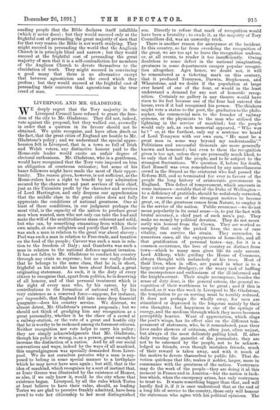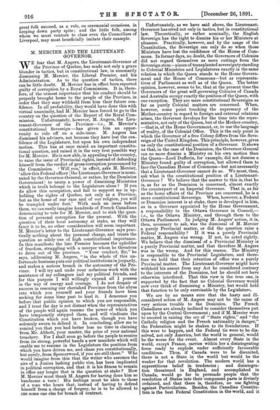LIVERPOOL AND MR. GLADSTONE.
WE deeply regret that the Tory majority in the Liverpool Council have refused to grant the free- dom of the city to Mr. Gladstone. They did not, indeed, vote against the proposal, but they walked out, avowedly in order that a quorum in its favour should not be obtained. We quite recognise, and have often dwelt on the fact, that the great cities of England are hostile to Mr. Gladstone's policy ; and we understand the special appre- hension felt in Liverpool, that in a town so full of Irish and Welsh voters, any distinctive honour paid to the Home-rule leader would excite an unfair degree of electoral enthusiasm. Mr. Gladstone, who is a gentleman, would have recognised that the Tory vote imposed on him an obligation of courteous reticence ; but some of his baser followers might have made the most of their oppor- tunity. The reason given, however, is not sufficient, as the Home-rulers have a right to benefit by any admiration secured by the character and past services of their chief, just as the Unionists profit by the character and services of Lord Hartington, and only deepens our apprehension that the middle class in the great cities does not fully appreciate the conditions of national greatness. One at least of these conditions, in our judgment perhaps the most vital, is the capacity of the nation to produce great men when wanted, men who not only can take the lead and make the will of the multitudinous mass coherent and solid, but who can, by something emanating from within their own minds, at once enlighten and purify that will. Lincoln was such a man in relation to the great war about slavery ; Peel was such a man in relation to Free-trade, and taxation on the food of the people ; Cavour was such a man in rela- tion to the freedom of Italy ; and Gambetta, was such a man in relation to the national defence against invasion. It has not fallen to Mr. Gladstone to conduct his country through any crisis so supreme; but no one really doubts that he belongs to the same class, that he is, in short, frightful as his mistake has been about Ireland, a great originating statesman. As such, it is the duty of every citizen to recognise that, apart from politics, he is deserving of all honour, and of that personal treatment which is the right of every man who, by his career, by his contributions to the formation of national will, by his very existence as a reserved force—suppose, for instance, per impossibile, that England fell into some deep financial quagmire—does his country service. We distrust, we almost detest, Mr. Gladstone's present proposals ; but we should not think of grudging him any recognition as a great personality, whether it be the cheer of a crowd at a railway-station, or the vote of a great and hostile city that he is worthy to be reckoned among its foremost citizens. Neither recognition nor vote helps to carry his policy ; they are simply acknowledgments that Mr. Gladstone, though his policy is wrong, is, as a person, great enough to increase the distinction of a nation. And by all our social conventions and ways, indeed by the ways of all mankind, this ungrudgingness was specially demanded from Liver- pool. We do not ourselves perceive why a man is sup- posed to belong in some special manner to a birthplace which he may never have seen again ; but still, that is the idea of mankind, which recognises by a sort of instinct that, as Ionic Greece was illustrated by the existence of Homer, so also, if we only knew it, would be the city where that existence began. Liverpool, by all the rules which Tories at least believe to have their value, should, as leading Tories we are glad to perceive frankly admitted, have been proud to vote her citizenship to her most distinguished son. Directly to refuse that mark of recognition would have been a brutality ; to evade it, as the majority of Tory- Councillors did, was an unworthy trick.
There is another reason for annoyance at the incident. In this country, so far from overdoing the recognition of the great, we are too apt to leave the recognition undone, or, at all events, to render it too insufficiently. Owing doubtless to some defect in the national imagination, greatness in some departments escapes popular recogni- tion altogether. Ages hence, we doubt not, it will be remembered as a ticketing mark on this century, that it produced Tennyson, Darwin, Stephenson, and Wheatstone, and we doubt if the population at large ever heard of one of the four, or would in the least understand a demand for any sort of honorific recog- nition. Certainly no gallery in any theatre would have risen to its feet because one of the four had entered the house, even if it had recognised his person. The thinkers might vote a statue to the poet, the graduates to the philo- sopher, the commercial men to the founder of railway systems, or the physicists to the man who utilised the lightning in the service of mankind ; but the people would only ask, as each memorial appeared, "Who was he " or, at the furthest, only say a sentence we heard of Lord Tennyson with our own ears, "He must be a great man in some way beyond my understandin'." Politicians and successful Generals are more generally known and honoured ; but even to them the recognition given is too apt, unless they are personally much liked, to be only that of half the people, and to be subject to the strangest fluctuations. We question if, before his death, Earl Russell was even remembered by any miscellaneous crowd in the Strand as the aristocrat who had passed the Reform Bill, and so terminated for ever in favour of the people the long history of aristocratic government in England. This defect of temperament, which amounts in some instances—notably that of the Duke of Wellington— to a deficiency of gratitude, should be sedulously corrected, for it removes one of the strongest motives to become great, or, if the greatness comes from Nature, to employ it in the service of the nation. Public reverence—we do not mean popularity in its usual sense—is, to put the fact with brutal accuracy, a chief part of such men's pay. They make no money by political devotion. They do not neces sarily win honour from the Crown. They are worked so savagely that only the picked lives, the men of rare vitality, can survive the strain. They surrender, in numerous cases, all the enjoyments of home-life, and all that gratification of personal tastes—say, for it is a common occurrence, the love of country as distinct from town—which to many men gives life its only savour. Lord Althorp, while guiding the House of Commons, always thought with melancholy of his trees. Most of their lives, when in office, are passed in what is to a large extent pure drudgery, or the weary task of baffling the incompetence and enthusiasm of the ill-informed and the knights-errant. Their single recompense, besides the sense of duty done, is the general esteem, the general re- cognition of their worthiness to be great ; and if this is refused, as it was this week in Liverpool to Mr. Gladstone, the temptation to go on serving must be terribly reduced. It does not perhaps die wholly away, for men are stimulated or depressed in the long-run mainly by their own thoughts ; but happiness is one of the springs of energy, and the medium through which they move becomes perceptibly heavier. Want of appreciation, which clogs the poet's wings, has its effect also on the different tem- perament of statesmen, who, be it remembered, pass their lives under showers of criticism, often just, often unjust, but always of the most delicately galling kind. If, after daily running the gauntlet of the journalists, they are not to be esteemed by the people, not to be acknow- ledged as friends, even though mistaken friends, much of their reward is taken away, and with it much of the motive to devote themselves to public life. That de- votion quickens that life, makes it nobler, larger, more in consonance with the greatness of the nation. Vestrymen may do the work of the people—they are doing it at this moment in France and in America—but the nation is luck- less which, when the emergency arises, has only vestrymen to trust to. It wants something bigger than that, and will hardly find it, if it is once understood that at the end of a long life of service to the country, those only will honour the statesman who agree with his political opinions. The great folk succeed, as a rule, on ceremonial occasions, in keeping down party spite ; and the little folk, among whom we must venture to class even the Councillors of Liverpool, may most beneficially imitate their example.



































 Previous page
Previous page